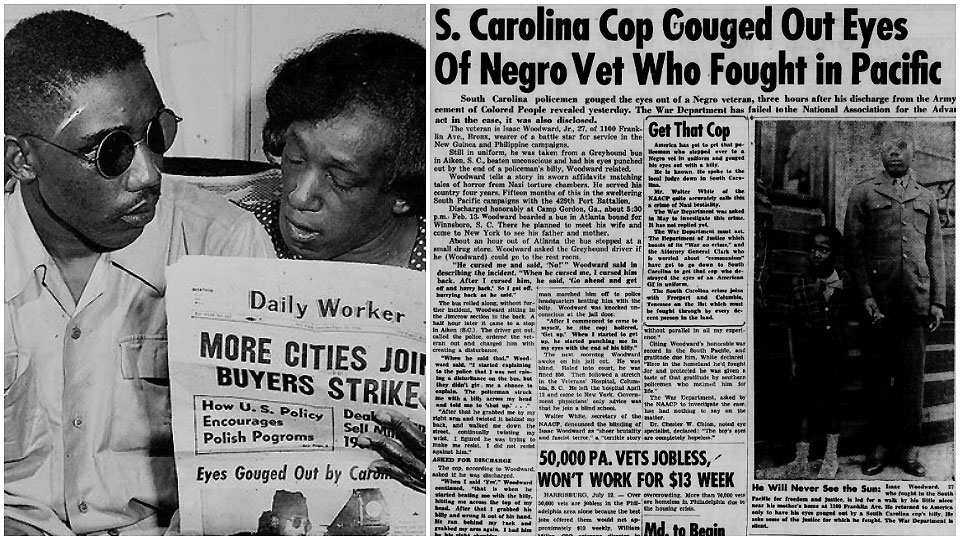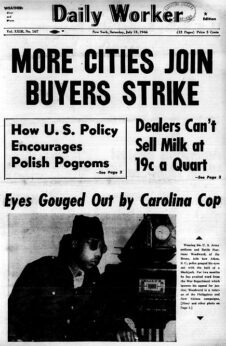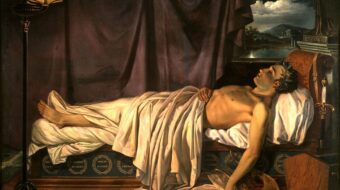
Writer-director Jamila Ephron’s new PBS film The Blinding of Isaac Woodard shows how great consequences can be ignited by smaller acts. In this case, the small act was one of a history of cruel injustices. The consequence was a sea change in public opinion and a movement which shaped the future of a country.
On Feb. 12, 1946, a group of recently discharged soldiers was taking a Greyhound Bus through the Deep South back home. The GIs were excited. They had just finished fighting in WWII and were on the verge of reuniting with their families.
Isaac Woodard (1919-1992) was an Army sergeant decorated for bravery under fire. He would be seeing his young wife for the first time in several years. Though subject to intense discrimination at home in the U.S., over 900,000 Black Americans had fought to protect the country which refused to allow them to vote or to receive an education and subjected them to unequal harsh justice.
Sgt. Woodard had complained on the trip home that the bus driver had refused him a rest stop to use the bathroom. Because he had complained, when the Greyhound stopped in Batesburg, S.C., Woodard was pulled off the bus by the local Police Chief Lynwood Shull. Shull and his deputies arrested Woodard, dragged him into a back alley, held him down, beat him severely, and gouged out his eyes. They then poured liquor over Woodard, claimed he was drunk and disorderly, fined him $50, and dumped him in a local hospital.

The Daily Worker newspaper, predecessor of People’s World, was among the first media outlets to report the attack on Woodard and played an important role in bringing the case to wider national attention. In its July 13, 1946, edition, a Worker reporter wrote: “Woodard tells a story in sworn affidavits matching tales of horror from Nazi torture chambers…sheer brutality and fascist terror….”
But the case might have been forgotten were it not for the intervention of the National Association for the Advancement of Colored People (NAACP) and America’s leading actor at the time, Orson Welles. The NAACP took the case to Welles. Week after week, Welles hammered away at this outrage on his nationwide ABC show “Orson Welles Commentaries,” even hiring private detectives to research what had transpired. Celebrities Billie Holiday, Joe Louis, Woody Guthrie, and Duke Ellington staged concerts and raised funds for Woodard.
Walter White, the NAACP’s Executive Secretary, met with President Truman in the Oval Office to review what had happened. Truman was moved by the injustice and pledged to address it.
But when Woodard’s case went to trial, it was grossly mishandled. The local U.S. Attorney only interviewed one person—the antagonistic bus driver. The defense attorney assigned to Woodard started shouting racial epithets against him. Presiding Judge Julius Waties Waring (1880-1968) had to stop him. Shull admitted to the blinding but was still acquitted by an all-white jury in only 30 minutes of deliberations.
The decision outraged Judge Waring. Despite coming from a Confederate, slave-owning family, the judge questioned the Jim Crow system. His experiences made him partial toward Civil Rights.
Although he risked alienating Southern political support (and in those days the Deep South was solidly Democratic), President Truman took action. He established a Presidential Committee on Civil Rights on Dec. 5, 1946. In June of the following year, he took the unprecedented step of personally addressing the NAACP’s national meeting. “There is no justifiable reason for discriminating because of race, color, or religion,” he told the assemblage.
Truman and Judge Waring’s pursuit of this principle became a turning point in guaranteeing rights to all American citizens. The government and the NAACP under the leadership of Thurgood Marshall worked to overthrow restrictions on voting and the separate but equal laws that resulted in discrimination against Blacks in education, transportation, and services throughout the South. Their actions culminated in the landmark Brown vs Board of Education of Topeka case in 1954, which helped open the doors to greater justice.
Famed left-wing singer/songwriter Woody Guthrie composed “The Blinding of Isaac Woodard” and sang it at New York City’s Lewisohn Stadium in front of over 36,000 people. He later recalled, “I got the loudest applause I’ve ever got in my whole life.”
Woodard’s “drunk and disorderly” conviction was vacated in 2018. In 2019, a new book about the Woodard story and its aftermath appeared, authored by Federal Judge Richard Gergel, Unexampled Courage: The Blinding of Isaac Woodard and the Awakening of President Harry S. Truman and Judge J. Waties Waring.
Also in 2019, a group of public-minded citizens received permission from the state of South Carolina to erect a historical marker unveiled that year regarding Woodard in Batesburg-Leesville. The bottom part of the marker was written in Braille.
Director Ephron, co-writer Mark Zwonitzer and narrator Andre Holland stitch together historians’ analyses, participants’ testimony, and vintage archival footage to provide a rich tapestry of the crucial historical battles that are being fought anew as Southern state legislatures again seek to take away voting rights primarily of African Americans.
The Blinding of Isaac Woodard premieres Tues., March 30 on PBS American Experience. The trailer can be viewed here.

MOST POPULAR TODAY


Communist Karol Cariola elected president of Chile’s legislature

Zionist organizations leading campaign to stop ceasefire resolutions in D.C. area

Afghanistan’s socialist years: The promising future killed off by U.S. imperialism

High Court essentially bans demonstrations, freedom of assembly in Deep South






Comments